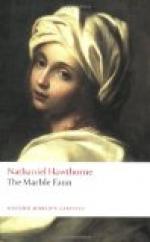Tomaso, the old butler, who was standing by the table, and enjoying the praises of the wine quite as much as if bestowed upon himself, made answer,—“We have a tradition, Signore,” said he, “that this rare wine of our vineyard would lose all its wonderful qualities, if any of it were sent to market. The Counts of Monte Beni have never parted with a single flask of it for gold. At their banquets, in the olden time, they have entertained princes, cardinals, and once an emperor and once a pope, with this delicious wine, and always, even to this day, it has been their custom to let it flow freely, when those whom they love and honor sit at the board. But the grand duke himself could not drink that wine, except it were under this very roof!”
“What you tell me, my good friend,” replied Kenyon, “makes me venerate the Sunshine of Monte Beni even more abundantly than before. As I understand you, it is a sort of consecrated juice, and symbolizes the holy virtues of hospitality and social kindness?”
“Why, partly so, Signore,” said the old butler, with a shrewd twinkle in his eye; “but, to speak out all the truth, there is another excellent reason why neither a cask nor a flask of our precious vintage should ever be sent to market. The wine, Signore, is so fond of its native home, that a transportation of even a few miles turns it quite sour. And yet it is a wine that keeps well in the cellar, underneath this floor, and gathers fragrance, flavor, and brightness, in its dark dungeon. That very flask of Sunshine, now, has kept itself for you, sir guest (as a maid reserves her sweetness till her lover comes for it), ever since a merry vintage-time, when the Signore Count here was a boy!”
“You must not wait for Tomaso to end his discourse about the wine, before drinking off your glass,” observed Donatello. “When once the flask is uncorked, its finest qualities lose little time in making their escape. I doubt whether your last sip will be quite so delicious as you found the first.”
And, in truth, the sculptor fancied that the Sunshine became almost imperceptibly clouded, as he approached the bottom of the flask. The effect of the wine, however, was a gentle exhilaration, which did not so speedily pass away.
Being thus refreshed, Kenyon looked around him at the antique saloon in which they sat. It was constructed in a most ponderous style, with a stone floor, on which heavy pilasters were planted against the wall, supporting arches that crossed one another in the vaulted ceiling. The upright walls, as well as the compartments of the roof, were completely Covered with frescos, which doubtless had been brilliant when first executed, and perhaps for generations afterwards. The designs were of a festive and joyous character, representing Arcadian scenes, where nymphs, fauns, and satyrs disported themselves among mortal youths and maidens; and Pan, and the god of wine, and he of sunshine and music, disdained not to brighten some sylvan merry-making with the scarcely veiled glory of their presence. A wreath of dancing figures, in admirable variety of shape and motion, was festooned quite round the cornice of the room.




